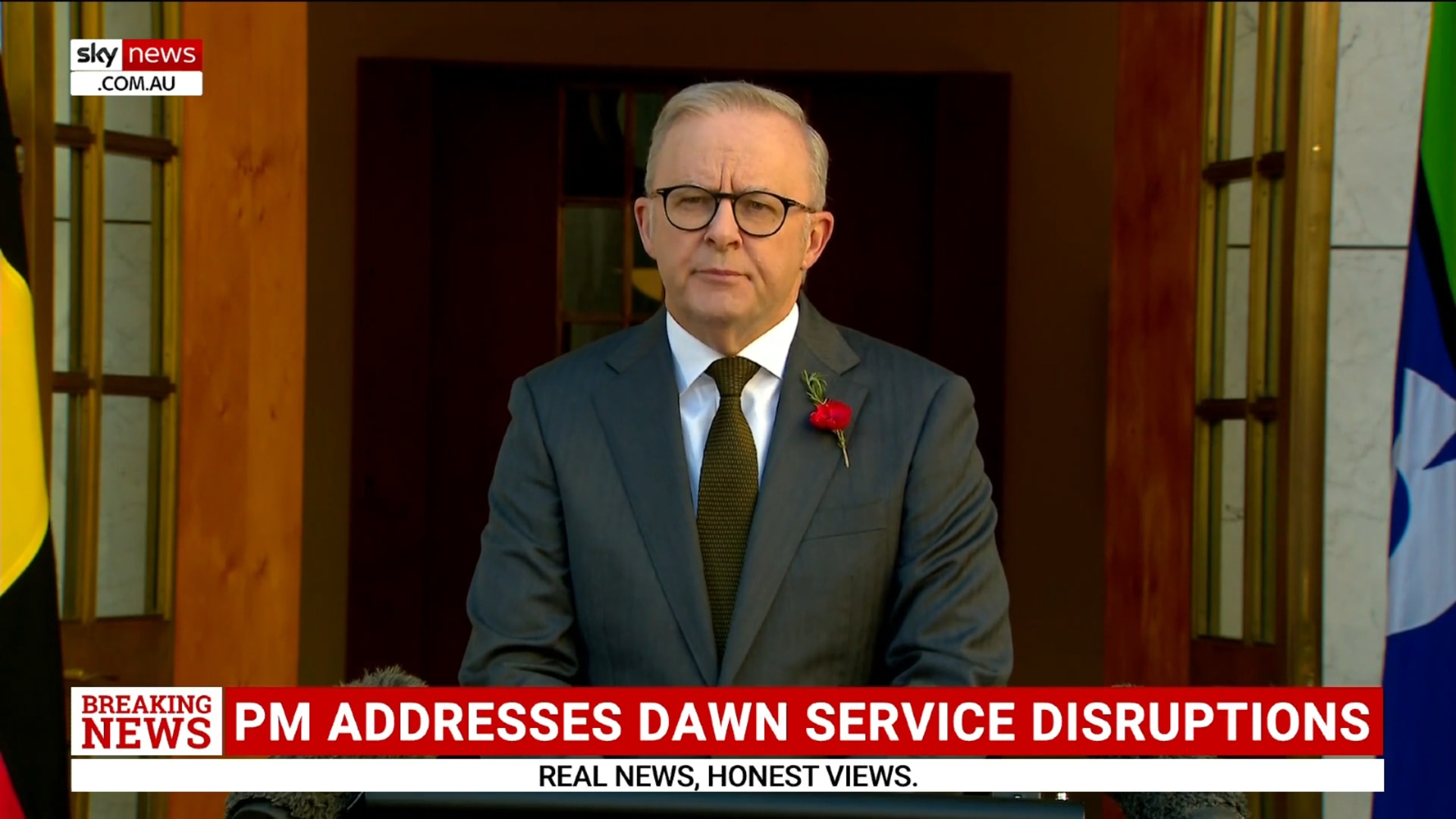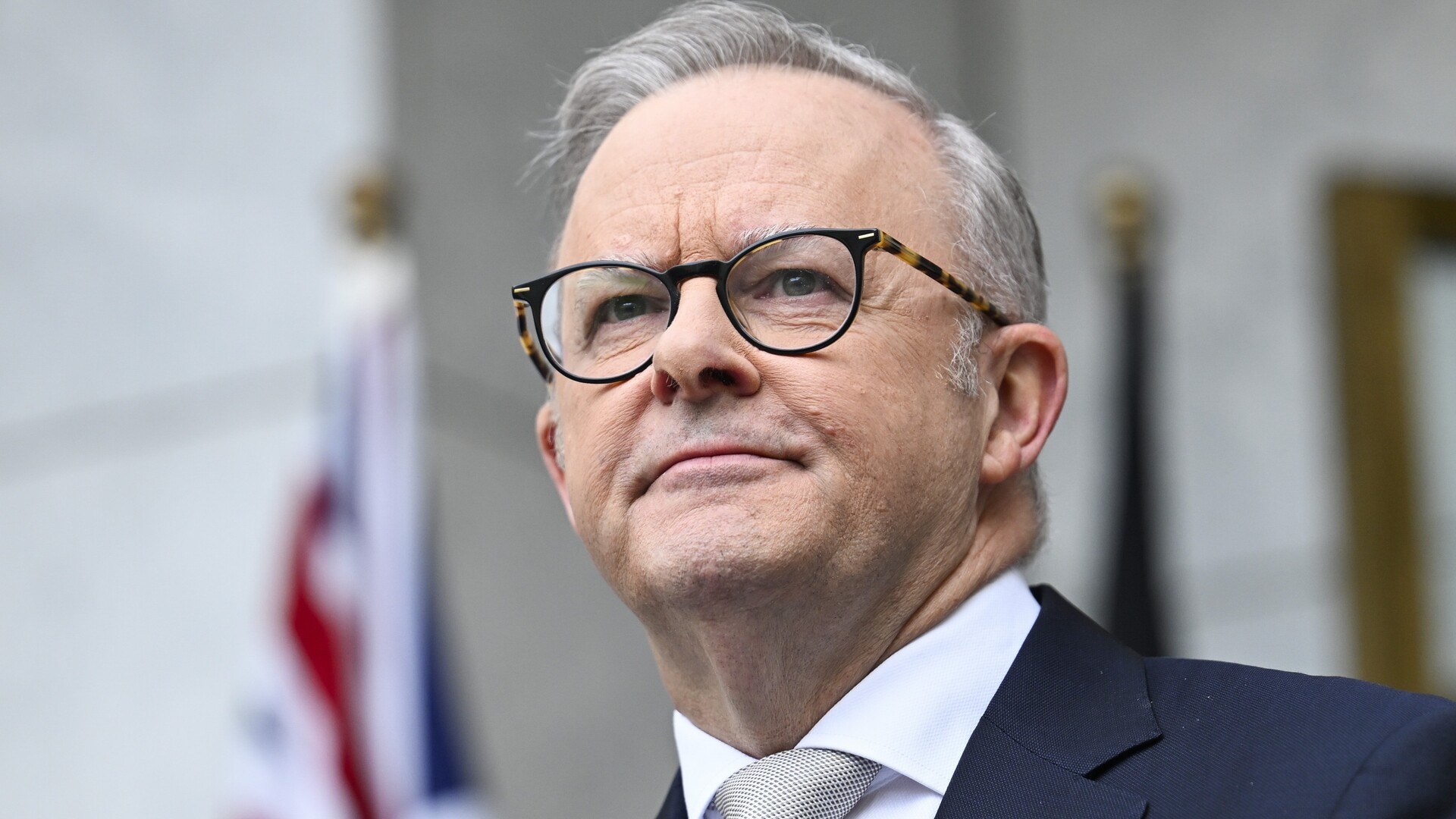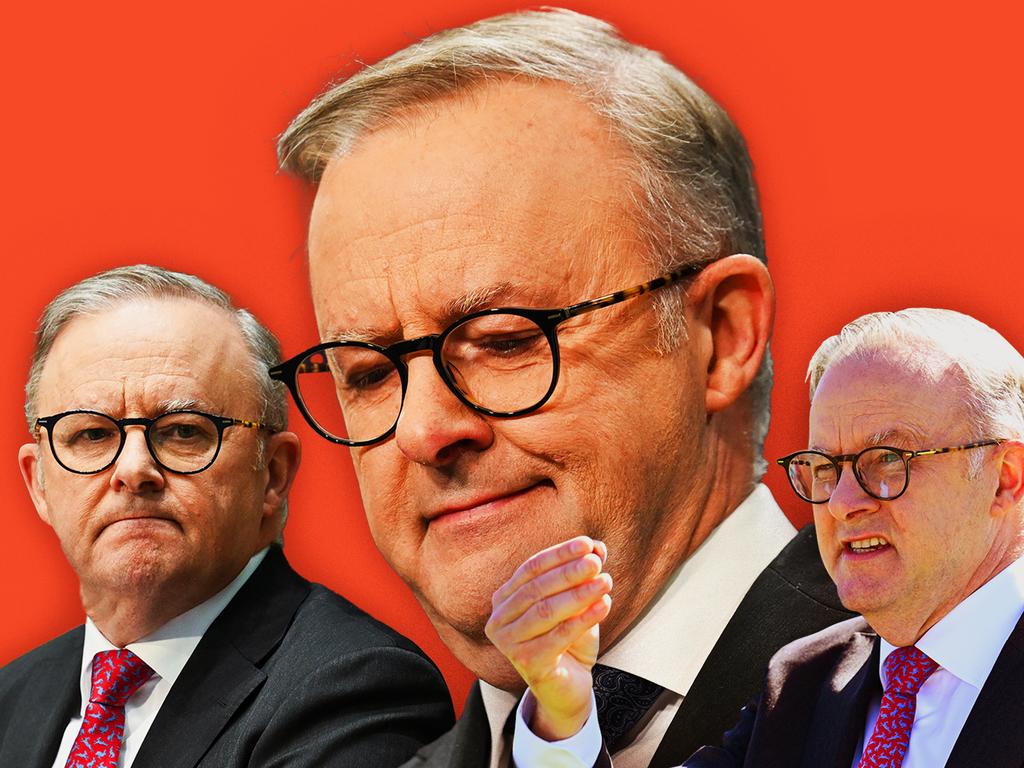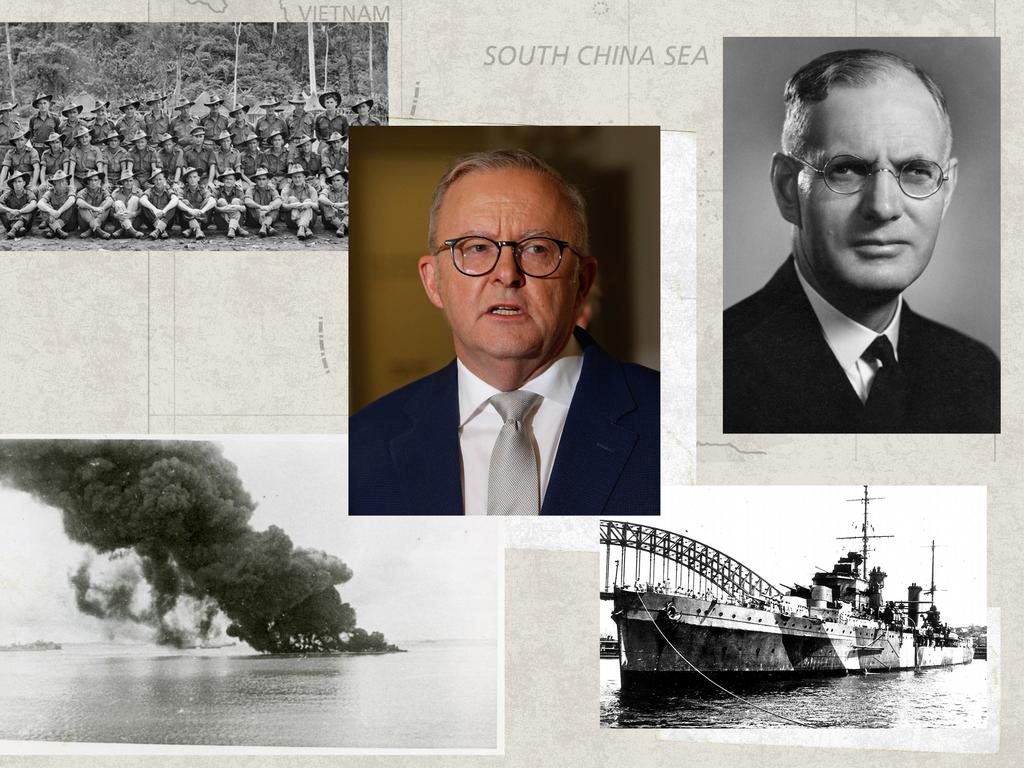Warrior turned pragmatist: Anthony Albanese’s ‘hinge of history’ moment
Determined not to repeat the mistakes of the US Democrats, Anthony Albanese wants to govern for all of middle Australia.
Anthony Albanese never had a sense of a future destiny as prime minister. He has always been underestimated by opponents and Labor colleagues. Now he approaches a hinge of history moment – the chance to become a substantial and long-serving Labor prime minister. Few would have believed it. Many still don’t.
On the campaign trail Albanese looks relaxed, fresh and confident. He is a natural campaigner, mixes easily, knows his lines, doesn’t fall into the embarrassing blunders of his first campaign as leader in 2022 and projects an authority as Prime Minister.
This election has three potential outcomes for Albanese: termination in defeat; diminished but surviving in minority government; or the result long seen as improbable – re-election as a majority PM, becoming only the third ALP prime minister to win consecutive elections after Gough Whitlam in 1974 and Bob Hawke in 1984.
But Albanese never thought this result improbable. He told the author in late 2024 that he believed he would win majority again. That was his message in his exclusive interview this week with Dennis Shanahan and me on his plane en route to the west.


Albanese is no policy maestro but he is an instinctive, experienced, political tactician. He has never been a star, an orator or a Rhodes scholar. Australia’s professional and academic classes, left or right, patronise him – reflecting their class snobbery. They denigrate him for matching neither their success nor intellectual distinctions. Indeed, compared with Whitlam, Hawke, even Kevin Rudd, he falls in the shadows. Don’t look for charisma, it’s not there. Most Labor people never saw him as a future leader and some still struggle to accept him.
But that’s OK by Albanese. He has made being underestimated into an art form that is now a political asset. He keeps proving the sceptics wrong. He became leader in 2019, won in 2022 and has performed a polling turnaround in the past month pointing to victory.
He tells Inquirer: “My government is the most stable first-term government that there has been in at least 50 years, more stable than the first terms of Whitlam, Fraser, Hawke, Howard, Rudd, Abbott etc, no scandals, no ministerial resignations. Order – we’ve done what we said we would do.”

Albanese was widely written off, post voice, with high energy prices, the inflation bogy and uninspiring government. But he backed his judgment against his opponents, calculating the public wouldn’t cancel him. Perhaps Albanese knew more about politics than his critics did.
We ask: will he serve a full term if he wins the election? You bet he will. Albanese is emphatic – in that situation he will do a full three-year term. Don’t fall for the easy response that he’ll be deposed as PM next term. That may not be easy at all. Much will depend on the election result. If he wins in a majority – still an uphill call – that will turn the orthodoxy upside down and vest Albanese with an authority he has never possessed before.

Such a result would leave the Coalition demoralised and raise the potential for a three-term ALP government.
A minority Albanese government where he suffered the loss of only a few seats would not necessarily doom his leadership given Albanese’s proven success as leader of the house in keeping alive the Gillard minority government.
Albanese tells Inquirer his aim is to reverse the trend and improve the Labor primary vote from its dismal 32.58 per cent at the 2022 election. That’s a low bar but it means there’s scope for improvement. In this quest he needs to make inroads against both the Coalition and the Greens. He believes he will.
His story is that of a warrior turned pragmatist. Albanese doesn’t deal in philosophical discourse, but he has a powerful sense of a political strategy – it’s about government intervention and state power to help the working class and blue-collars, and it’s about the universality of social benefits to help the aspiring middle class.
It’s old-fashioned policy where everything is reconciled by the politics.


He is deeply influenced by the failure of the Democratic Party across many years to repair the plight of Middle America, thereby opening the door to Donald Trump. His message: this won’t happen in Australia. In a short time he has recast the Trump factor to his advantage at the election, helped immeasurably by Trump.
Initially assailed for not visiting Washington to meet the President and for his alleged inability to deal with Trump, Albanese stands as a national interest leader repudiating Trump’s tariffs but willing to work with our main ally.
In the interview he has a message for Trump – don’t try to dictate to Australia. Asked about any US pressure for allies to spend 3 per cent of GDP on defence, Albanese says the nation’s “sovereign interest” would govern his response. He says: “We have been good allies, loyal allies and good partners, and I expect us to be treated with respect, including by the Trump administration.” He has another message for the US – don’t think you can dictate Australia’s trade policy.

Asked about signals that the Trump administration may want its friends to support its trade war on China by also taking restrictive actions against Beijing, Albanese says: “China is the largest destination for our exports. Almost a quarter of our exports are going to one destination.
“When there were trade impediments from China on Australian exports in an area like beef, the US didn’t hesitate to fill that gap by sending more beef to China. Australia must represent our own national interest at a time when the US is, without any provocation or cause, imposing tariffs unjustly on Australia.
“It would be extraordinary if the Australian response was to say: ‘Thank you, and we will help to further hurt our economy.’ ”

Albanese was ready when the US imposed its standard 10 per cent tariff on Australia, saying it was “not the act of a friend”. In the interview he says Rudd got “very close” to winning an exemption for Australia. In their earlier discussion, Albanese said Trump had been “constructive” and he would be pursuing the trade issue if re-elected.
Will a meeting with Trump be a priority? “I’ll go soon, but we’re not getting ahead of ourselves,” he replies.
On defence, Albanese is flexible. His pragmatism kicks in when asked about Peter Dutton’s path-breaking step – 2.5 per cent of GDP on defence by five years and 3 per cent by 10 years.
“If we need assets, we will invest in it,” he says. Pressed on whether he will act on any need to increase the defence budget, Albanese says: “Yes.” But if Labor invests more it won’t be based on a “magic number” but on “the assets that we need”.

He is forced on to the defensive here, rightly so. Labor’s defence spending – to reach 2.3 per cent of GDP in a decade – is dangerously inadequate. Why didn’t Dutton release his policy months earlier to get traction on defence as a Coalition issue?
“Australia is clearly going to have to step up in the region,” Albanese says, referring to Trump’s disruptions. He will reach out to Japan, South Korea, Association of Southeast Asian Nations partners and Pacific nations. Albanese says there are regional concerns about Trump’s policies on tariffs, climate and cutting the aid budget. Everyone knows the consequences. “Any gaps which are in the region, China will seek to fill,” he says.
Albanese doesn’t want to introduce new factors into an election campaign he thinks he is winning. Yet it is a low-grade campaign, marked by lies and negative assaults. Once an ideological activist, as Prime Minister he is a hip-pocket gradualist, using the budget to pacify myriad interest groups and voting constituencies.
“We’ve dealt with the pressures,” he says. “We have a good record. We’ve got more to do going forward and the people to do it as well.” Many people will scoff at these claims. But Albanese knew support for his government was always a function of the lack of support for the Coalition.
He travels the country relentlessly, saying he has made 32 trips to Western Australia since the last election – the pivotal state that delivered him office in 2022 – and has visited every seat in the West. He is confident the West will hold for Labor next weekend.


His career is devoid of glamour and excitement. For much of the Rudd-Gillard period, he was infrastructure and transport minister, with local government thrown in. When you talk to Albanese it’s a seat-by-seat account, he knows the country, knows the candidates and knows the local campaign is more vital than ever.
The public sees his policy weakness and lack of inspiration but misses his political skill and cunning. He’s no wordsmith but he relates to people. If he wins this election, then “Albo” becomes part of the furniture, the political uncle people don’t much like but aren’t prepared to throw out of the house.
Albanese prioritises stability, no shocks, no dramas. Apart from his support of the voice, Albanese is a conventional, almost an old-fashioned Labor PM, elected to parliament at the 1996 election and re-elected nine times, the party and the parliament are in his blood.
Through the years he has changed and modified some of his old ideological mantras. He champions nuclear-powered submarines; he believes in free trade; he is re-practising the Catholic faith. Indeed, affected by the death of Pope Francis, Albanese says: “I read many of his speeches. I think he is one of the most consequential figures of the century.” He was attracted by the Pope’s support for social justice.

Albanese will always be a marginal proposition, but the days of great leaders are behind us. Unlike his predecessor, Bill Shorten, for most of his time in parliament Albanese was not seen as a future leader. It was the 2013 election defeat that changed his life. Albanese entered the leadership contest with Shorten, lost, but staked his claim. After Shorten was defeated at the 2019 election, Albanese became leader unopposed.
He inherited a party that was devastated and angry at defeat – and far from convinced Albanese was the answer. By the middle of the last term, there was unrest about Albanese as leader, lots sceptical that he would prevail. In many ways the future of the Labor Party depended on winning in 2022, thereby avoiding a fourth successive loss. Albanese got there – just. He fell over the line. He made Scott Morrison the issue and led Labor into a small-target strategy. It worked. Ever since, the media has puzzled: what does Albanese PM stand for?
He doesn’t talk socialism any more, or protectionism, or Hawke-Keating reformism, or say much about the Rudd-Gillard era, let alone his early years as a left activist and rabble rouser. But Albanese has fashioned a different pragmatic strategy for Labor circa 2025. It is captured in his mantra “no one held back, no one left behind”. This is the Australia Albanese seeks; it is his operating guide book. He sees it as a fusion of compassion and aspiration.
Albanese says: “A modern Labor constituency is working people who are in unions, sole traders and people working for themselves.”
He must deliver this more broadbased political approach to lift Labor’s base vote. But can he pull off such a daunting task? It’s doubtful, perhaps only with a weak Liberal Party.


He is deeply fixated on where Joe Biden and the Democrats went wrong. The Trumpian electoral success is embedded in Albanese’s brain as the essential contemporary lesson for Australia. “We cannot go down that polarisation road that you are seeing in the US,” he says. “The alienation of the blue-collar working-class voter from the Democratic Party is something that is a warning for centre-left and social democratic parties.”
He wants government intervention and industrial relations laws to buttress working-class jobs and wages, while he is using the budget to deliver social benefits on the principle of universality to reach a wider middle-class constituency.
For Albanese, all policy contradictions are resolved by political necessity. He champions both the industrial sector and the clean energy economy.
Invoking the blue-collar class, he says: “That’s what the Future Made in Australia agenda is about. That’s why the visit to Whyalla with the steelworks, to Tomago for aluminium.” Ensuring the workers are not left behind is his justification for the industrial relations changes. For Albanese, “same job, same pay” laws are about guaranteeing that Australia “cannot go down that polarisation road that you are seeking in the US”.

He widens the lens, pointing out that energy bill relief goes to everyone; seeks to strengthen the universality of Medicare; justifies childcare support for people earning up to $530,000 because “universality as a principle is important in garnering broad support for the reforms that are needed”. Sure, but it’s really about unpinning voting support for Labor further up the income scale and locking in the backing of tertiary-educated women.
Asked whether he wanted to represent a miner earning $200,000 Albanese said: “Absolutely, because they deserve to be represented, and they work hard and they have a family that they need to look after.” This answer contrasts with Bill Shorten during the 2019 campaign when confronted by a miner on $200,000 plus who asked what Shorten would do for him – with Shorten having to duck the question.
In essence, Albanese is far removed from the Hawke-Keating age. Labor could almost be another party. There’s no will to tighten the budget, reform much of the non-market government sector, promote genuine tax reform as opposed to relying on personal income tax “bracket creep” to finance bigger government. He has undermined the Keating enterprise bargaining model; he talks about the need for productivity while his policies have little hope of delivering such productivity.

This penetrates to the ultimate fate of the Albanese government: its entire legitimacy hinges on restoration of living standards, real wages, non-inflationary economic growth, higher productivity and a vibrant market economy – but if the policy structure doesn’t deliver these outcomes, then Labor will be judged a failure.
Albanese’s re-election pitch is astonishing – it’s more of the same. Any second Albanese government will resemble and build on the first. Most of the senior ministers will keep the same portfolios. Given the polls for 18 months have shown voters hostile or disillusioned towards Albanese and his government, that strategy is a calculated risk. Yet it seems to be working.
Albanese doesn’t say this but his strategy seems to be working because the Dutton-led Coalition misjudged the nation.
He is no tough-love Prime Minister. He sees himself as a fair man – but if you cross him, then you will pay. He gives his ministers a wide discretion but is always ready to intervene when needed – just ask Tanya Plibersek.
He says “what keeps me completely grounded” is thinking “what would my mum think” from her life as a Labor loyalist imbued with working-class concerns. That’s true. He never forgets his mum and he carries his past with him. But Albanese has travelled a long way from his origins and is proud of constantly proving his detractors wrong, yet again.
The question remains: how long can he keep doing it?







To join the conversation, please log in. Don't have an account? Register
Join the conversation, you are commenting as Logout